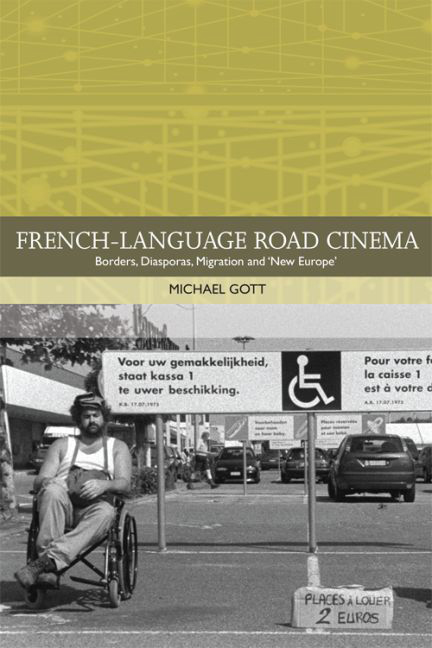Book contents
- Frontmatter
- Contents
- Acknowledgements
- List of Illustrations
- Traditions in World Cinema
- Introduction
- 1 Mapping the Hybrid European Road: French Connections, European Traditions and American Influence?
- 2 Remapping the European Road
- 3 Cowboys, Icebergs, Anarchists and Toreadors: The Paradoxes and Possibilities of the Francophone Belgian Road Cinema
- 4 Travelling Beyond the National: Mobile Citizenship and Flexible Identities in French-language Return Road Movies
- 5 The End of the Road? Dark Routes and Urban Passageways
- Conclusion
- Works Cited
- Index
5 - The End of the Road? Dark Routes and Urban Passageways
Published online by Cambridge University Press: 12 September 2017
- Frontmatter
- Contents
- Acknowledgements
- List of Illustrations
- Traditions in World Cinema
- Introduction
- 1 Mapping the Hybrid European Road: French Connections, European Traditions and American Influence?
- 2 Remapping the European Road
- 3 Cowboys, Icebergs, Anarchists and Toreadors: The Paradoxes and Possibilities of the Francophone Belgian Road Cinema
- 4 Travelling Beyond the National: Mobile Citizenship and Flexible Identities in French-language Return Road Movies
- 5 The End of the Road? Dark Routes and Urban Passageways
- Conclusion
- Works Cited
- Index
Summary
Films covered: Hope (Boris Lojkine, 2014, France), Illégal (Olivier Masset- Depasse, 2010, Belgium/France/Luxembourg), Marussia (Eva Pervolovici, 2013, France/Russia)
This chapter changes direction in order to consider two related strands of cinema that are thematically and politically linked to road movies but are arguably less evidently classified as such. Previous chapters have considered road movies that engage primarily with open and soft iterations of borders. In those films, which I have labelled ‘positive’, it is only when European subjects venture beyond Schengen Europe that they face hard borders (explained most succinctly by Eder as police ordering travellers to stop), and in those cases the barriers generally prove to be only temporary. In this chapter I will consider two varieties of what I have more provisionally termed ‘negative’ films, in which subjects are confronted with hard borders, both on the way to and following their arrival in Europe. As Dominic Thomas contends, if ‘migration has emerged as a key geometric coordinate of globalization today, then so too has the concern with controlling the planetary circulation of human beings (labour forces, asylum seekers, refuges), particularly when it comes to the African continent’ (2012a: 157; original emphasis).
Hope (Boris Lojkine, 2014, France) narrates a voyage to Europe, through Algeria and Morocco, by two Africans, the eponymous female Nigerian protagonist and Léonard, a Cameroonian man she encounters en route. While unquestionably a journey narrative, the film's focus on obstacles and the protagonists’ dramatic differences from typical road movie travellers result in a cinematic voyage that is unlike that of most road films. Hope reworks common road movie conventions that stage travel as a joyful platform for discovery and growth. Illégal (Olivier Masset-Depasse, 2010, Belgium/France/Luxembourg) and Marussia (Eva Pervolovici, 2013, France/Russia) both follow female (im) migrants from Russia as they attempt to secure footholds in Brussels and Paris, respectively. These two films would appear to be even more distant from the road movie template given the fact that the long voyages to Western Europe are already complete. The hero of Marussia is a relative newcomer to France whereas the narrative of Illégal picks up after the protagonist had already spent eight years in Belgium.
- Type
- Chapter
- Information
- French-language Road CinemaBorders, Diasporas, Migration and 'New Europe', pp. 148 - 177Publisher: Edinburgh University PressPrint publication year: 2016

